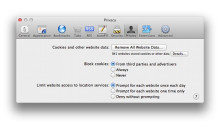Google to pay $17M settlement for bypassing Apple's Safari security settings
As part of a settlement announcement on Monday, Google has agreed to pay out $17 million to 37 U.S. states, as well as the District of Columbia, for ignoring anti-tracking protocols baked in to Apple's Safari Web browser.
According to New York Attorney General Eric Schneiderman, the state attorneys general took Google to task over unauthorized placement of cookies on users' machines when they visited sites on the Internet search giant's DoubleClick ad network between 2011 and 2012, reports PCWorld.













































































